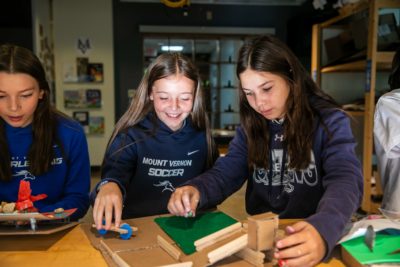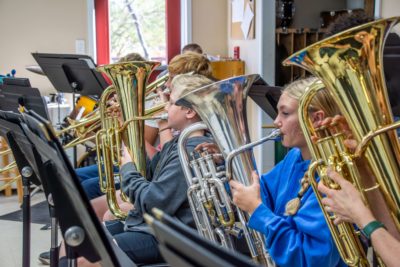You may be enjoying the lazy, hazy, crazy days of summer right now, but the start of the upcoming school year is around the corner (not to burst your sun-drenched bubble). And while you may not be ready to head to the local big box store to purchase new school clothes and supplies just yet, it’s never too early to get in the right mindset and make plans to have a spectacular school year. With that in mind, KnowAtlanta Magazine asked educators and administrators from private schools across the metro Atlanta area to share their tips and advice with students and their families for having a fun, productive and highly successful 2025-2026 academic year. Here’s what they had to say.
In Summer
 There’s so much more to the school year than what happens within the classroom walls day in and day out. In fact, what you and your student do at home—even during the summer—can make a significant difference in the way the year starts and progresses. The following tips will help you prep your child, tween or teen for what’s to come when the first day of school is upon you.
There’s so much more to the school year than what happens within the classroom walls day in and day out. In fact, what you and your student do at home—even during the summer—can make a significant difference in the way the year starts and progresses. The following tips will help you prep your child, tween or teen for what’s to come when the first day of school is upon you.
“Don’t wait until the night before school starts to adjust your child’s bedtime. About two weeks before the first day, begin shifting bedtime and wake up times earlier and earlier in small increments. Easing back into a school sleep schedule gives your child’s circadian rhythm time to adjust and avoids cranky kids on the first day!”
— Ellye Millaway, Director of Mental Wellness, Pace Academy
“Reboot your home systems: clean out backpacks, junk drawers, desk spaces and any other areas of your home that have become cluttered or are not functioning well. Summer is the perfect time to invest in organization and systems that will serve you well in the new school year.”
— Dr. Nancy Jones, Lower School Dean of Counseling and Student Services/Director of Counseling, Wesleyan School
“Create a healthy schedule that balances free play, down time and structured activities. At the start of the school year, children need time to adjust to new routines, academic demands and social settings. Avoid overscheduling your family. A balanced schedule supports physical and emotional well-being, offers time to develop social skills and allows for creative play, which is critical for brain development.”
— Erica Pendleton, Early Elementary School Counselor, Trinity School
The Classroom Connection
 Making the most of the classroom experience means more than simple memorization and excellent test-taking skills. Students need guidance from both parents and teachers to ensure that every day is a constructive and rewarding one. And while academics are always at the forefront, it’s important to understand the many elements that are in play during each school day so your student can focus and make the grade.
Making the most of the classroom experience means more than simple memorization and excellent test-taking skills. Students need guidance from both parents and teachers to ensure that every day is a constructive and rewarding one. And while academics are always at the forefront, it’s important to understand the many elements that are in play during each school day so your student can focus and make the grade.
“Reflect and revise. Look back over the previous school year and ask yourself what worked and what didn’t—and why those things did or did not work. Be honest with yourself; self-awareness is key to initiating a meaningful change for the better.”
— Dr. Nancy Jones
“Be intentional. The best school years don’t happen by accident. Be clear about who you are, what you value and how you want to grow. When students, families and educators lead with purpose, it sets the tone for deep learning and meaningful connection.”
— Nigel A. Traylor, Vice President for Academic and Student Life , Woodward Academy
“Create order in the chaos. Middle school students thrive when clear structures are in place, allowing their brains to focus on learning and engaging. It’s essential to support the development of executive functioning skills, including time management, organization and effective study habits.”
— Matt Nuttall, Principal, High Meadows School
“Start with questions. Encourage curiosity from day one. At Mount Vernon, inquiry drives learning, helping students develop agency and purpose. When students ask bold questions, they uncover deeper understanding—and even design solutions that impact the world around them.”
— Kristy Lundstrom, Head of School, The Mount Vernon School
A Support System
 The people who surround your children—from you and your family members to the faculty and peers with whom they spend a majority of each day—can play a major factor in the outcome of a school year. It’s important to create a welcoming support system for students of every age, and there are several steps you can take to ensure that your student feels encouraged and motivated to learn and thrive.
The people who surround your children—from you and your family members to the faculty and peers with whom they spend a majority of each day—can play a major factor in the outcome of a school year. It’s important to create a welcoming support system for students of every age, and there are several steps you can take to ensure that your student feels encouraged and motivated to learn and thrive.
“Before school starts, talk with your child about how they might handle potential stressors before they happen. Ask, ‘Who would you talk to if something goes wrong?’ or ‘What helps you feel better on a rough day?’ Identifying these tools and strategies in advance helps kids feel more prepared and equipped to take on challenges when they come.”
— Ellye Millaway
“Integrate positive communication into your family routine. Look for daily moments when your child can share worries, successes and questions without fear of judgement. Time in the car and bedtime can be natural opportunities for conversation. Talking through challenges helps children process their experiences, learn from them, build confidence and grow problem-solving and decision-making skills. When parents share their own struggles and how they handle them, they model resilience and encourage open dialogue. Additionally, consistent communication deepens parent-child bonds and encourages children to seek guidance and support when they face academic or social obstacles.”
— Erica Pendleton
“Create space for voice and choice. Anytime you can give middle schoolers a choice in what their options are, it will typically work out for the best.”
— Matt Nuttall
“Find your people. A thriving school year begins with connection. Whether it’s a teacher, coach or classmate, strong relationships fuel motivation and well-being. Community is the foundation for learning—and we intentionally design time and space for students to build it.”
— Kristy Lundstrom
Beyond the Books
 The school year can be long and arduous, but there are ways that you can help your student enjoy every moment possible and become a truly well-rounded individual. From encouraging them to get involved with their school community outside of the classroom to making sure that they know how to take care of themselves and their own well-being, you have many options for boosting your child’s comfort and overall satisfaction as the school year moves along.
The school year can be long and arduous, but there are ways that you can help your student enjoy every moment possible and become a truly well-rounded individual. From encouraging them to get involved with their school community outside of the classroom to making sure that they know how to take care of themselves and their own well-being, you have many options for boosting your child’s comfort and overall satisfaction as the school year moves along.
“Establish family rules and expectations. Set clear guidelines for screen time, sleep and eating routines and hold each other accountable. When expectations are clearly defined and consistently reinforced, children feel more secure and in control of their environment. Clear limits around sleep, nutrition and screen use help support physical health and mental well-being, which directly supports academic success and attention in school.”
— Erica Pendleton
“Engage in the full experience. School is more than tests, assignments and transcripts. Join the club. Go to the game. Cheer for someone else. Try something new. The moments that stretch us—on stage, on the field, in leadership roles—are the ones that build confidence, community, and character."
— Nigel A. Traylor
“Pursue passion plus purpose. From athletics and the arts to internships and global experiences, students should explore and take ownership of their unique pathways. When learners see how their interests connect to meaningful work, engagement soars—and so does impact.”
— Kristy Lundstromn
For more information, visit:
High Meadows School, The Mount Vernon School, Pace Academy, Trinity School, Wesleyan School, and Woodward Academy.



 There’s so much more to the school year than what happens within the classroom walls day in and day out. In fact, what you and your student do at home—even during the summer—can make a significant difference in the way the year starts and progresses. The following tips will help you prep your child, tween or teen for what’s to come when the first day of school is upon you.
There’s so much more to the school year than what happens within the classroom walls day in and day out. In fact, what you and your student do at home—even during the summer—can make a significant difference in the way the year starts and progresses. The following tips will help you prep your child, tween or teen for what’s to come when the first day of school is upon you. Making the most of the classroom experience means more than simple memorization and excellent test-taking skills. Students need guidance from both parents and teachers to ensure that every day is a constructive and rewarding one. And while academics are always at the forefront, it’s important to understand the many elements that are in play during each school day so your student can focus and make the grade.
Making the most of the classroom experience means more than simple memorization and excellent test-taking skills. Students need guidance from both parents and teachers to ensure that every day is a constructive and rewarding one. And while academics are always at the forefront, it’s important to understand the many elements that are in play during each school day so your student can focus and make the grade. The people who surround your children—from you and your family members to the faculty and peers with whom they spend a majority of each day—can play a major factor in the outcome of a school year. It’s important to create a welcoming support system for students of every age, and there are several steps you can take to ensure that your student feels encouraged and motivated to learn and thrive.
The people who surround your children—from you and your family members to the faculty and peers with whom they spend a majority of each day—can play a major factor in the outcome of a school year. It’s important to create a welcoming support system for students of every age, and there are several steps you can take to ensure that your student feels encouraged and motivated to learn and thrive. The school year can be long and arduous, but there are ways that you can help your student enjoy every moment possible and become a truly well-rounded individual. From encouraging them to get involved with their school community outside of the classroom to making sure that they know how to take care of themselves and their own well-being, you have many options for boosting your child’s comfort and overall satisfaction as the school year moves along.
The school year can be long and arduous, but there are ways that you can help your student enjoy every moment possible and become a truly well-rounded individual. From encouraging them to get involved with their school community outside of the classroom to making sure that they know how to take care of themselves and their own well-being, you have many options for boosting your child’s comfort and overall satisfaction as the school year moves along.





